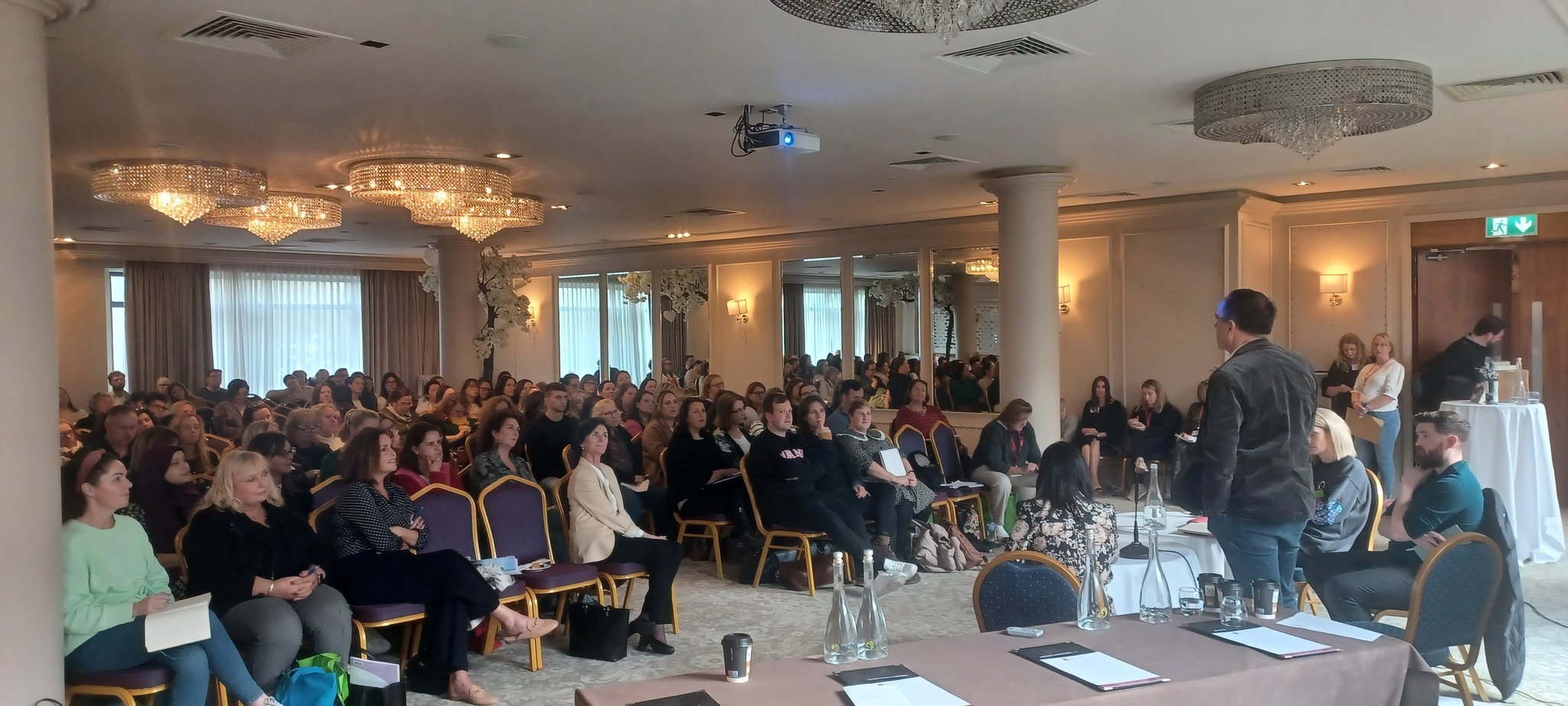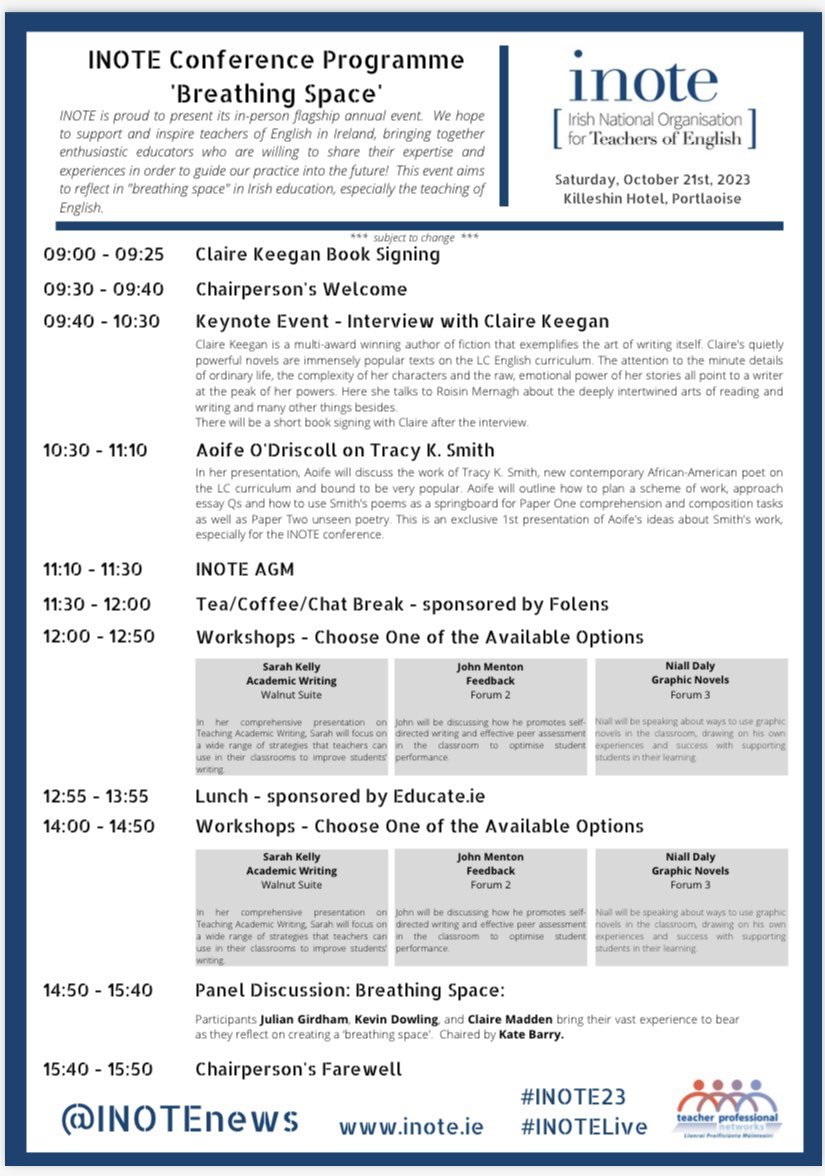INOTE 23
The highlight of the year for English teachers in Ireland is the INOTE conference, when we gather in a friendly spirit to collaborate and celebrate what we love doing. On Saturday the second in-person conference since the pandemic took place in Portlaoise.
Acting Chair Mikey Meally introduced the year’s theme, ‘Breathing Space’. Among the issues he considered was the need to reflect on the Junior Cycle before reform of the Senior Cycle starts. Earlier in the week this year’s JC results came out, and he pointed out how ‘mean-spirited’ the marking scheme and the consequent grades are. And in future Senior Cycle reform must provide a meaningful learning experience for both students and teachers.
There was considerable excitement that the main speaker this year was the writer Claire Keegan. Her story Foster has been much-taught in Irish schools over the last decade (she has twice visited my own school to talk about it), and my Book of 2021, Small Things Like These, has now arrived on the Leaving Certificate syllabus. Judging by the chat around the Killeshin Hotel, many schools will be taking up the opportunity to study it.
The INOTE interviewer was Róisín Mernagh, who pointed out how universally powerful the story Foster is, judging by her own experience with Syrian students. This interview saw Keegan being particularly open (listen also to this excellent interview with Sean Rocks on Arena recently). For her as a teacher of creating writing, the core is how reading works. Paragraphs are our best friend. She quoted Flannery O’Connor at the Iowa Writers’ Workshop, and pointed out that as teachers we have to be prepared to displease if necessary:
The high-school English teacher will be fulfilling his responsibility if he furnishes the student a guided opportunity, through the best writing of the past, to come, in time, to an understanding of the best writing of the present. He will teach literature, not social studies or little lessons in democracy or the customs of many lands. And if the student finds that this is not to his taste? Well, that is regrettable. Most regrettable. His taste should not be consulted; it is being formed.
Claire Keegan went back to her own schooldays, the Primary years of which were fulfilling. All small children can tell a story, but by the time they arrive as adults in Keegan’s workshops, often adults cannot: what has happened? Stories are a record of human upsets, an incision in time. Everything we have we can lose (I thought of Elizabeth Bishop’s poem ‘One Art’), and this is the material for story-telling: it is in all of us. Clarity never ruins stories: it is in fact liberating, and good writing is good manners. She said ‘I don’t like being grabbed by a story’ (and gave the opening of The Godfather as the model of how to start a narrative). Like a singer, if you start high you then have nowhere to go. Creative writing should not be about self-expression but rather restraint. Emotions are never immoral - it is only when enacted by behaviour that they can be so. She cited John McGahern, whose influence is clear in her work: everything interesting starts with one person in one place.
Róisín Mernagh asked her if indeed the nameless girl in Foster is the girl in the convent in Small Things? “I really don’t know”. But she has been trying to work out what happened to the girl in Foster when she went home after her summer months with the Kinsellas. Perhaps this may come out in the novel she is currently writing, set on the farm she herself grew up on.
Next in the main room was Aoife O’Driscoll, always much trusted by English teachers for her comprehensive understanding of literature and her confidence in showing how this can be addressed in the classroom. Her subject was Tracy K. Smith, whose poetry has just arrived on the Leaving Certificate list for the first time. As she said, there really is a level of maturity required here (on the way down I realised I need to wait until later in the course before introducing Smith to my own pupils). Aoife looked at the poem ‘Joy. Elegy 1’, an accessible one to start with, and showed how the selection of poems can be used for linked tasks. She will have more to say at her webinar for Tralee Education Support Centre on November 13th: free registration.
We had to select two of the three workshops, though I always want to go to all three. Before lunch, I chose Sarah Kelly’s Teaching Academic Writing, in which she gave fine-grained tips on improving writing on literature. As she said, the PCLM marking scheme places considerable cognitive load on students, and giving them sentence-level structures helps with this pressure, providing opportunities rather than constraining them. Sarah gave plenty of detailed examples of how all this can work, citing along the way Essential Grammar by Jennifer Webb and Marcello Giovanelli, and Explicit English Teaching by Tom Needham, both of which I will be writing about here in future.
That idea of structure freeing and enabling students also came through after lunch in John Menton’s session on providing feedback. He showed the ways in which he has refined and made more efficient his own feedback, thus reducing his workload and helping his students progress better, as well as giving them time to reflect on their own writing. As he said, this has evolved partly through collaboration with his departmental colleagues.
Finally, I was on the concluding panel alongside Clare Madden and Kevin Dowling, with Kate Barry posing the questions. Each of us spoke about what ‘breathing space’ meant in our own schools (for me, partly expressed in this recent post on the importance of studying poetry).
Other topics included why English needs more time in the timetable and is the ‘best’ subject, encouraging reading in schools (Clare Madden’s has ingeniously directed this through the filter of ‘wellbeing’), curricular reform, the text we most look forward to teaching, ‘weak’ texts, the comparative module and more.
Another treat for the day was the 2023 edition of the INOTE magazine, edited for the first time by Will Byrne. There is a lot of material here which I enjoyed at home after returning from the event, from debating to AI to diversity to note-taking. For the moment here I comment just on the first piece, in which Cathy Keane goes back to the pre-INOTE English teaching world, and specifically the Association of Teachers of English, founded in 1963 and which I remember in its latter years: amazing that speakers included Doris Lessing, Seamus Heaney and Eavan Boland. Two Nobel Prize-winners!
It was good to see also recognition in that article of Kevin McDermott who was so positive as the English Second Level Support Service co-ordinator, and was a visitor to several events in our own school. He was a superb editor of Teaching English, the predecessor of the INOTE magazine, for which I wrote occasionally: last term I posted this piece on the 2009 Paper 2 ‘fuss’. Have a look at the relevant Winter 2011 edition. Kevin is still involved in education as a creative writing teacher.
As teachers we build our expertise from our school colleagues as well as the wider teaching community, and those of us who are more experienced should consider it essential to support and help build up the next generation of teachers. This is what Kevin did, and this is what events like INOTE do. They are an essential part of our educational ecosystem, and it is cheering to see the baton being handed on so well. Many thanks to all who organised INOTE 2023.

